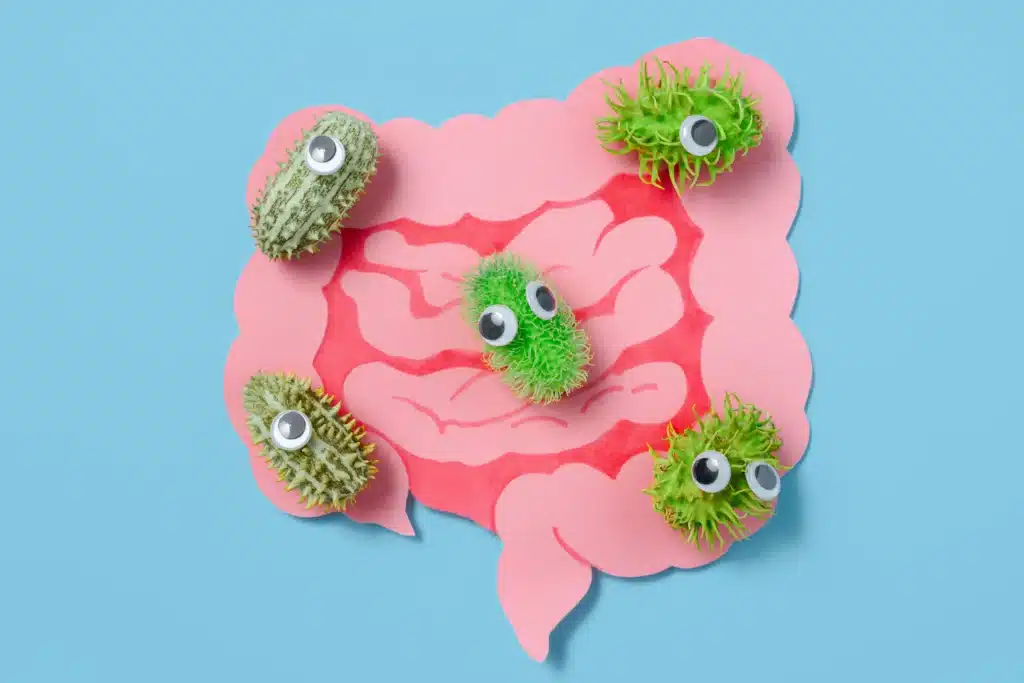Relation of Certain Bacteria Found In Our Body And Weight Management Is Proving Newer Concepts In Microbiology, Nutrition And Medicine.
Most everyone knows weight is affected by one’s metabolism, genetic makeup and even some physiological factors. However, certain recent researches are suggesting relationships between a person’s microbiota (the science of studying biological components in a particular region) and varying changes in gut functions—especially in the context of gut health and weight loss—with its role in fat storage, metabolism, appetite-controlling hormones, and digestion coming into sharper focus.
To put simply, for you as a Diabetes patient or any other person who is weight conscious, there is a need to pay attention to the germs or microbes that reside in your gastrointestinal tract.
Following sections will outline:
- Relationship between gut bacteria and weight management (both positive and negative 😤)
- The gut bacteria which may be helping or hindering progress
- Steps to improve balance of the gut microbiome
Scope: What Is Gut Microbiota And Why Is It Important?

Gut health is looking after one’s bones and being active. Importance of gut health isn’t simple as it touches on many factors of a human body, but in direct relation to balance of multitude of living organisms such as bacterium, virus, and fungi composing the gut.
Optimal digestion reflects a balanced microbiome and all the processes that take place, such as:
- Nutrient absorption
- Immune function
- Digestion
- Mood management
Gut dysbiosis, the imbalance of gut bacteria, may result in increased bloating and, in some cases, inflammation. On the other hand, a well-balanced gut can:
- Suppress appetite and cravings
- Enhance the body’s ability to burn fat
Microbiota and Weight Management

Let’s assume weight loss can be achieved through:
- Exercise
- Calories consumed
- Macronutrient ratio
The latter can be tied to the gut microbiome. In this article, we would like to summarize the relationship of gut microbiota to obesity with a focus on metabolism.
Gut Microbes in Metabolism
Some microbes residing in the intestines can capitalize on calories more effectively than others. For example, some fiber-digesting microbes create short-chain fatty acids. While these gut bacteria are beneficial, excessive amounts may be harmful because they can over-boost calorie expenditure within the body. These microbial interactions further highlight the complex link between gut health and weight loss, reinforcing the importance of a balanced gut microbiome in maintaining a healthy weight.
Gut Microbiome and Appetite Regulation
“Aspergillus and other Streptomyces microbes that form propioic acid can help in controlling the release of satiety-associated hormones such as leptin and ghrelin. Within certain parameters, the brain and stomach can communicate through the gut-brain axis, working to maintain hunger and satiety balance.”
Gut Microbiome and Adipose Tissue
“Efforts to lose weight could be made more difficult due to an imbalance in the body’s gut, which is a form of chronic inflammation, simplifying its underlying causes.”
Bacteria That Promotes Weight Loss
“Not everyone classified as overweight or obese has the same type of gut bacteria. The following are some of the gut bacteria which are thought to help reduce body weight.”
1. Bacteroidetes
“Increased proportions of Bacteroidetes compared to Firmicutes may improve weight management, maintaining a favorable balance.
These bacteria assist in polysaccharide fermentation and short-chain fatty acid production, which aids in fat burning.”
2. Lactobacillus
“Other carbohydrates are fermented and converted to short-chain fatty acids that assist fat burning.
Specific strains such as Lactobacillus gasseri are linked with reductions in weight and waist circumference.”
3. Prevotella
“Members of the genus Prevotella are distinguished by their additional metabolite-derived biosynthesis pathways.
Individuals with Prevotella-dominated microbiomes might respond better to weight loss on high-fiber diets, indicating a stronger predominant bias toward fiber diets. This is what Optimum Biome suggests.”
Poor Gut Health Blocking Your Weight Loss? Here’s What to Do
Optimizing and refining the functionality of the gut microbiome should start from a multi-level approach, involving:
- Losing weight
- Gut health
- Probiotics
- Bacteria balance
Steps to Enhancing the Functionality of Your Gut Microbiome
1. Increase Consumption of Prebiotic Foods
Prebiotics are defined as beneficial fibers that feed your gut bacteria. Prebiotic foods include:
- Garlic
- Onions
- Bananas
- Asparagus
- Oats
- Apples
Furthermore, nutrition helps boost Bacteroides and Akkermansia.
2. Include Foods Rich in Probiotics
Essential probiotic-supplemented foods are critical for gut health. Include:
- Kefir
- Kimchi
- Sauerkraut
- Miso
- Tempeh
Even vegetarian options offer probiotic-rich foods such as yogurt. Beneficial gut bacteria like Lactobacillus are also supplied by these foods.
3. Expand Your Diet Gradually While Giving Priority to Dietary Fibers
Foods high in fiber aid digestion and are instrumental in fostering beneficial bacteria such as:
- Whole grains
- Legumes
- Fruits and vegetables
4. Limit Sugary and Processed Foods
Processed and sugary foods facilitate the growth of harmful bacteria, causing imbalance in the gut’s microbiome.
For optimal gut health, whole foods should be prioritized.
5. Physical Activity
Workouts:
- Ease stress
- Reshape the body
- Aid in weight loss
- Are beneficial for gut health
It is critical to tend to the internal microbiota biodiversity residing in the gut—thus, promoting gut health is vital.
6. Focus on Managing Stress
Stress exacerbates gut dysbiosis, reducing good bacteria while increasing harmful ones.
Stressors, coupled with poor diets, negatively affect the gut.
Practices like yoga, meditation, and breathing exercises not only calm the mind but also heal the gut.
Fitness and Healthy Guts Are Interconnected
In this case, fitness lovers not only manage or try to shed off some pounds, but also find assistance in the gut.
A well-functioning gut:
- Improves nutrient absorption
- Decreases inflammation
- Aids in recovery from physical exertion
A proper workout plan combined with a nutritious diet:
- Fosters better gut health
- Accelerates weight loss goals
Conclusion: Your Gut, The Mysterious Control Switch
The gut microbiome can facilitate or impede your weight loss journey.
Profound changes and building beneficial bacteria can bolster your health.
Reminder: Everyone has a different gut—this is why there are different physiological responses.
Knowing your gut type and the bacteria associated with weight gain helps in achieving personalized fitness goals.




Pingback: Why Diet vs Exercise for Fat Loss Is Still a Hot Debate?